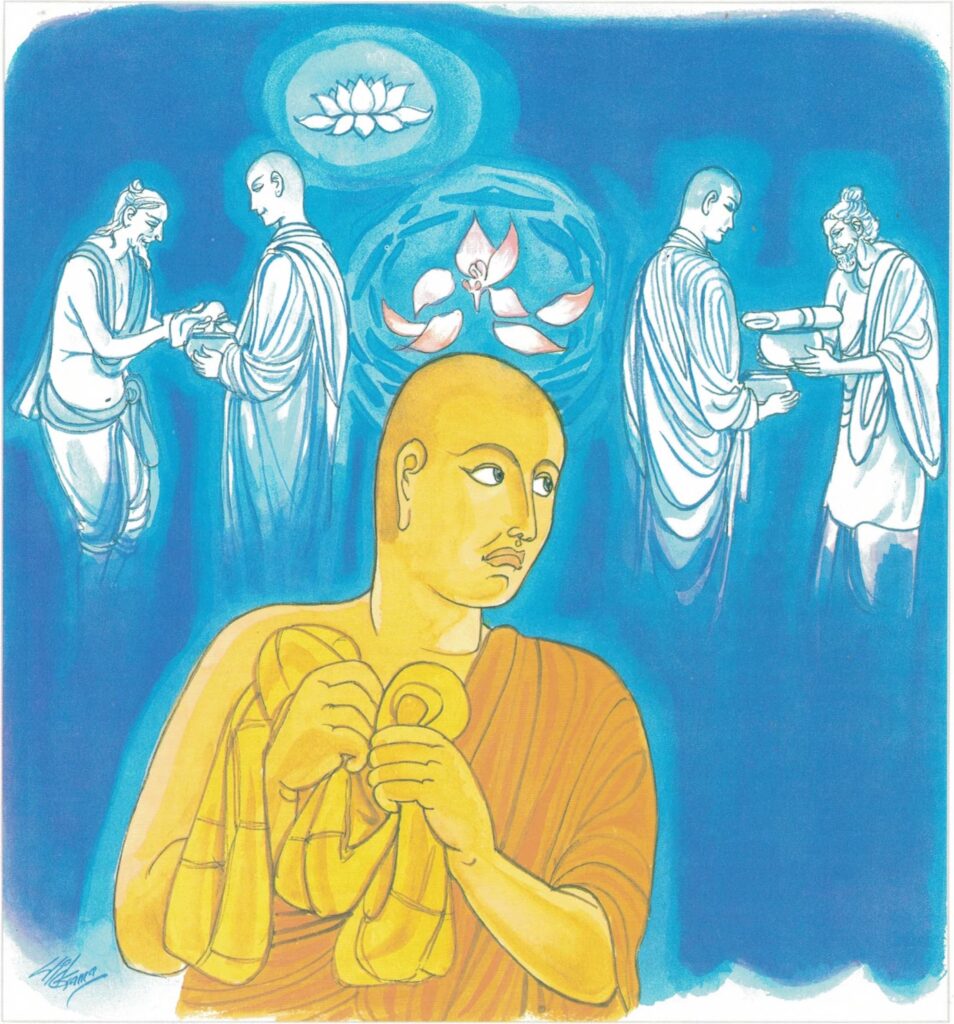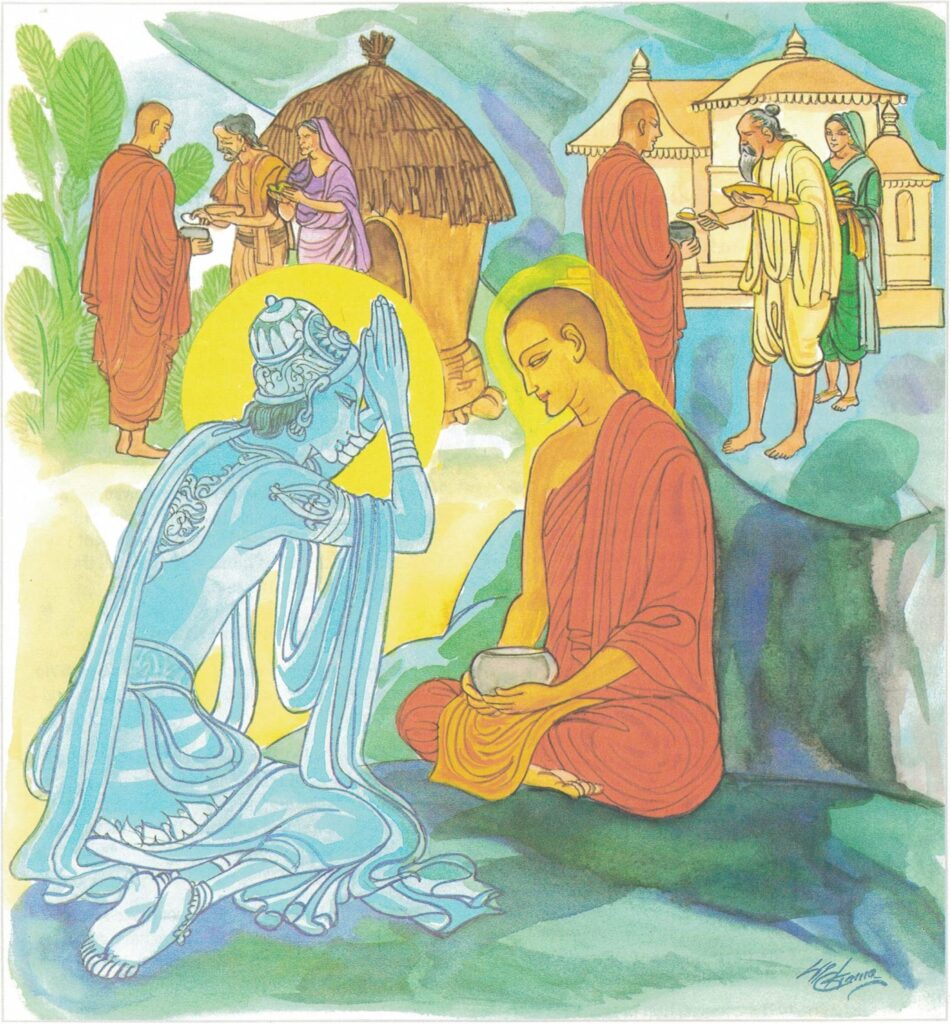Pali text, illustration and English translation of Dhammapada verse 365-366:
salābhaṃ nā’timaññeyya nā’ññesaṃ pihayaṃ care |
aññesaṃ pihayaṃ bhikkhu samādhiṃ nā’dhigacchati || 365 ||
appalābho’pi ce bhikkhu salābhaṃ nā’timaññati |
taṃ ve devā pasaṃsanti suddhājīviṃ atanditaṃ || 365 ||
365. He should not disdain his gains nor live of others envious, the bhikkhu who is envious does not attain collectedness.
366. Disdaining not his gains, though little he receives, pure of life and keen that bhikkhu devas praise.


The Story of the Traitor Monk
Once, a monk of the Buddha was very friendly with a monk belonging to the faction led by Devadatta, the opponent of the Buddha. One day as he was returning from his breakfast, after accompanying his brother monks on their alms-round, the schismatic monk met him and asked him, “Where have you been?” “To such and such a place on my alms-round.” “Did you get any food?” “Yes, I got some.” “Here we receive rich gifts and offerings; stay with us here for a while.” The monk did as his friend suggested, tarried with Devadatta’s monks for several days, and then returned to his own community.
The monks reported his offense to the Buddha, saying, “Venerable, this monk has been enjoying the gifts and offerings bestowed upon Devadatta; he is a partisan of Devadatta.” The Buddha caused the monk to be summoned before him and asked him, “Is the report true that you have done thus and so?” “Yes, Venerable, I tarried with Devadatta’s monks for a few days on account of a young monk who is a personal friend of mine, but I do not favour Devadatta’s views.” Said the Buddha, “Granted that you do not hold erroneous views; yet you rove about as though you held the views of everyone you meet. But this is not the first time you have done such a thing; you did the same thing also in a previous state of existence.”
Said the monks, “Venerable, we have seen with our own eyes what he did just now; but whose views did he hold in a previous state of existence? Pray tell us all about it.” So in response to their request, the Buddha related the following story:
Story of the Past: Elephant Damsel-face, Mahilāmukha Jātaka
After listening to the conversation of thieves and murderers, a well-behaved elephant became unruly and kills his keepers. But after listening to the conversation of sages and brāhmans, he became well-behaved again. The elephant damsel-face was the traitor monk.
After listening to the words of thieves of old, Damsel-face ranged hither and thither, killing and destroying. But after listening to the words of men of self-control, This best of elephants recovered all of his good qualities.
When the Buddha had related this Mahilāmukha Jātaka, he said, “Monks, anyone who is a monk should be contented just with what he has received, and should not covet that which others have received. For if he covets that which others have received, he will attain neither trance nor spiritual insight nor paths nor fruits,–not one of these. But if he be content with that alone which he has himself received, all these things will be added unto him.”
Explanatory Translation (Verse 365)
salābhaṃ nātimaññeyya āññesaṃ pihayaṃ na care
aññesaṃ pihayaṃ bhikkhu samādhim na ādhigacchati
salābhaṃ [salābha]: what one has given; nātimaññeyya: do not underestimate; āññesaṃ [āññesa]: gain of others; pihayaṃ [pihaya]: expecting; na care: do not go about; aññesaṃ pihayaṃ bhikkhu: the monk who expects the gains of others; samādhiṃ [samādhi]: tranquility of mind; nādhigacchati: will not reach
Do not under estimate what you have received. And again, do not expect what others have got. If a monk covets what others have received, he will never attain tranquility of mind.
Explanatory Translation (Verse 366)
bhikkhu appalābho api ce salābhaṃ nātimaññati
suddhājīviṃ atanditaṃ taṃ devā ve pasaṃsanti
bhikkhu: the monk; appalābho api: even receiving very little; ce: if; salābhaṃ [salābha]: what has been received by one; nātimaññati: does not disregard; suddhājīviṃ [suddhājīvi]: possessing pure lives; atanditaṃ [atandita]: not lethargic; taṃ: that monk; devā api: even deities; pasaṃsanti: praise
The monk may have received only a little but he does not underestimate what was given him. He is satisfied with what he has received. Such a monk, who leads a pure livelihood, is praised by deities.
Commentary and exegetical material (Verse 365-366)
In this verse the Buddha admonishes the monks to be content with what they receive. They are advised not to think of what others receive. Contentment with whatever you receive is described as appicchatā and paccaya santosa. Appicchatā–having only a few wishes (contentedness)–is one of the indispensable virtues of the monk. The four noble usages of a monk are: contentedness (of the monk) with any robe, contentedness with any alms food, contentedness with any dwelling, and delight in meditation and detachment. “Now, the monk is contented with any robe, with any alms food, with any dwelling, finds pleasure and enjoyment in mental training and detachment. But neither is he haughty on that account, nor does he look down upon others. Now, of a monk who herein is fit and indefatigable, who remains clearly conscious and mindful, of such a monk it is said that he is firmly established in the ancient, Noble Usages known as the most lofty ones.”
The Bhikkhu Order: The Order of bhikkhus (the Buddhahood) started with the five-fold monks to whom the Buddha preached his first sermon. From that time the Sangha grew after the admission of Yasa to the Sangha.
In Vārāṇasī there was a millionaire’s son, named Yasa, who led a luxurious life. Realizing the vanities of worldly life, he stole away from home, saying “Distressed am I, oppressed am I”, and went in the direction of Isipatana where the Buddha was temporarily residing after having enabled the five monks to attain arahantship.
Thereupon the Buddha said–“Here there is no distress, O Yasa! Here there is no oppression, O Yasa! Come hither, Yasa! Take a seat. I shall expound the Dhamma to you.”
The distressed Yasa was pleased to hear the encouraging words of the Buddha. Removing his golden sandals, he approached the Buddha, respectfully saluted Him and sat on one side. The Buddha expounded the doctrine to him, and he attained the first stage of sainthood (sotāpatti).
At first the Buddha spoke to him on generosity (dāna), morality (sīla), celestial states (sagga), the evils of sensual pleasure (kāmādīnava), the blessings of renunciation (nekkhammānisaṃsa). When He found that his mind was pliable and was ready to appreciate the deeper teachings He taught the four noble truths.
Yasa’s mother was the first to notice the absence of her son and she reported the matter to her husband. The millionaire immediately dispatched horsemen in four directions and he himself went towards Isipatana, following the imprint of the golden slippers. The Buddha saw him coming from afar and, by His psychic powers, willed that he should not be able to see his son. The millionaire approached the Buddha and respectfully inquired whether He saw his son Yasa.
‘Well then, sir, down here please. You would be able to see your son,” said the Buddha. Pleased with the happy news, he sat down. The Buddha delivered a discourse to him, and he was so delighted that he exclaimed.
“Excellent! It is as if a man were to set upright that which was overturned, or were to reveal that which was hidden, or were to point out the way to one who had gone astray, or were to hold a lamp amidst the darkness, so that those who have eyes may see! Even so has the doctrine been expounded in various ways by the Buddha.”
“I take refuge in the Buddha, the Doctrine and the Sangha. May the Buddha receive me as a follower, who has taken refuge from this very day to life’s end!” He was the first lay follower to seek refuge with the threefold formula.
The hearing the discourse delivered to his father, Yasa attained arahantship. Thereupon the Buddha withdrew His will-power so that Yasa’s father might be able to see his son. The millionaire beheld his son and invited the Buddha and His disciples for alms on the following day. The Buddha expressed His acceptance of the invitation by His silence.
After the departure of the rich man Yasa begged the Buddha to grant him the lesser and the higher ordination. “Come, O monks! What I taught is the Doctrine. Lead the holy life to make a complete end of suffering.” With these words the Buddha conferred on him the higher ordination. With the Venerable Yasa the number of arahants increased to six.
As invited, the Buddha visited the rich man’s house with his six disciples. Venerable Yasa’s mother and his former wife heard the doctrine expounded by the Buddha and, having attained the first stage of sainthood, became His first two lay female followers.”
Venerable Yasa had four distinguished friends named Vimala, Subāhu, Punnaji, and Gavampati. When they heard that their noble friend had shaved his hair and beard and, donning the yellow robe, entered the homeless life, they approached Venerable Yasa and expressed their desire to follow his example. Venerable Yasa introduced them to the Buddha, and on hearing the Dhamma, they also attained arahantship.
Fifty more worthy friends of Venerable Yasa, who belonged to leading families of various districts, also receiving instructions from the Buddha, attained arahantship and entered the holy Sangha. Hardly two months had elapsed since His Enlightenment when the number of arahants gradually rose to sixty. All of them came from distinguished families and were worthy sons of worthy fathers.